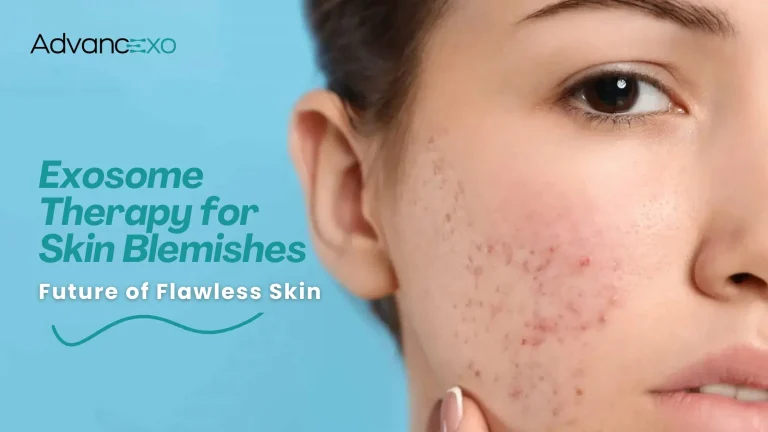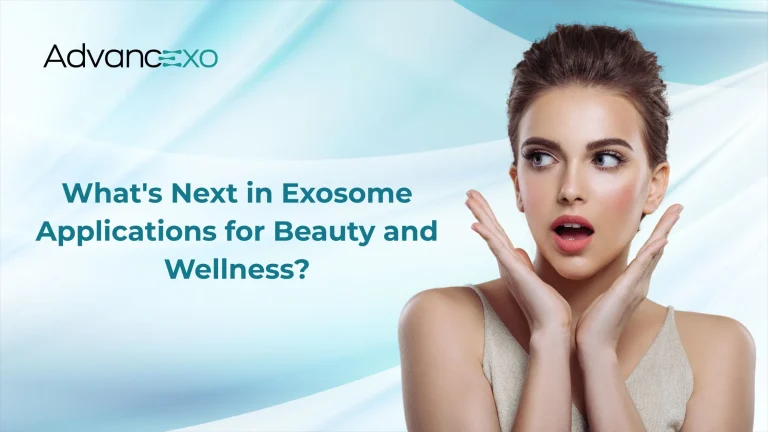Exosome therapy has emerged as a game changer in the evolving tapestry of cosmetic treatments. This revolutionary treatment has captivated the attention of dermatologists and patients alike, by unlocking the secrets to rejuvenation.
Exosomes are tiny vesicles, which cells use for communication, with huge impact. However, the treatment often encounters limited awareness, leading to many misconceptions and hesitation regarding its use, particularly for human exosomes. People are doubting- are exosomes safe for skin and hair loss. This blog dissects those myths with scientifically proven facts.
Myths and Facts of Exosome Therapy
Myth 1: Stem Cell-derived Exosome Treatment is Equivalent to Stem cell Treatment
Fact: Stem cells and their exosomes are two different entities. Although both possess regenerative properties, stem cells are live, dividing cells whereas stem cell-derived exosomes are cell-free products containing biomolecules that have effects similar to stem cells.
Myth 2: Human-derived Exosomes Cause Cancer
Fact: The risk of cancer has been associated with stem cells, resulting in a doubt if human-derived exosomes cause cancer. However, they cannot replicate like stem cells and, therefore, Exosomes do not cause cancer. On the contrary, researchers have been investigating them for cancer therapy. A research study has reported that human-derived exosomes inhibit the proliferation of cancer cells, thus exerting an anti-cancer effect.
Myth 3: Stem Cell-derived Exosomes Cause Unwanted Immune Responses
Fact: Stem cells are associated with the possibility of undesired immune responses falsely propagating the same belief for exosomes. However, they are acellular (do not contain cells) products of stem cells and according to scientific data, they do not trigger any immune response.
Myth 4: Exosome Treatments are Painful
Fact: Exosome treatment is actually minimally invasive. Their small size allows their easy penetration into the skin making their topical application possible.
Myth 5: All Exosomes are the Same Irrespective of the Source
Fact: Each cell is different and thus packs exosomes with distinctive bioactive components. For instance, exosomes from milk contain miR2478 whereas those from a human source contain miR21.
That’s why the source matters when it comes to exosome treatment. Currently, human-derived umbilical cord mesenchymal stem cells (MSCs) are the most suitable source in the market. Scientists refer to these stem cells as “Age 0” cells, for not integrating the aging effects present in other cells. They also show higher regenerative potential along with properties like immune regulation, anti-inflammation, antioxidation, and angiogenesis. They have a low risk of triggering an adverse immune reaction facilitating the use of their exosomes. Moreover, human exosomes are synthesized to interact with human cells gaining them an inherent advantage over those belonging to other species.
Myth 6: Exosome Treatment Does Not Work
Fact: According to several research papers published in world-class, reliable scientific journals, exosome therapy is effective in cosmetic treatments. In fact, the therapy has attracted scientists to discover its applications for life-threatening diseases.
Myth 7: Exosome Treatment is only an Anti-Aging Solution.
Fact: Due to its regenerative potential, many believe that exosome therapy is only an anti-aging treatment. However, they are also effective for treating serious medical issues like atopic dermatitis, melasma, psoriasis, etc. Moreover, as a part of skincare it can also treat dull and dry skin, blemishes, uneven skin, acne scar reduction, and dark spots for a better skin texture as well.
Myth 8: Exosome Therapy are only Suitable for Skin Treatments
Fact: Exosome treatment is versatile. It is also applicable for the treatment of hair thinning and hair loss due to androgenetic alopecia, alopecia areata, and telogen effluvium.
Myth 9: Exosome Therapy Requires More Downtime
Fact: Contrary to the belief, exosome therapy has negligible downtime. Scientific literature has even evaluated it with different techniques like laser resurfacing, microneedling, and chemical peels. The outcomes showed mild and temporary redness due to inflammation. The data revealed that the therapy did not cause inflammation but reduced redness due to its anti-inflammatory property, resulting in shorter healing times.
Myth 10: More Exosomes Means Better Results
Fact: The number of exosomes does not matter as much as what is inside them. The bioactive composition of these vesicles comprises biomolecules such as proteins, lipids, RNAs, cytokines, and growth factors. These molecules orchestrate the healing and rejuvenation effects. Therefore, composition matters more than the numbers.
Clinical Evidence
Exosome treatment has shown notable improvements in overall skin texture and hair growth, without causing any side effects of exosome therapy. Following are some of the studies that evaluated human-derived MSC exosomes, proving that they are safe for hair loss and skin issues.
- A trial in Singapore specifically assessed their safety and measured various parameters. The results concluded that there are no side effects of exosome therapy (NCT05523011).
- An institute in Korea employed a combination of human MSC exosomes and needle radiofrequency for acne reduction. The acne severity notably decreased, and skin texture enhanced after the treatment. Mild redness was present in the patients, but it resolved within 45 minutes due to the anti-inflammatory property of exosomes.
- Another group researched the effectiveness of the therapy in hair loss. The study demonstrated increased hair density and thickness with human MSC exosomes without leading to any complications.
A Precautionary Tale
Exosome therapy is completely safe for hair loss and skin concerns as demonstrated by the scientific data. However, there have been reports of infections but not from the therapy itself, but from the exosome formulation used in the procedure. Therefore, look for the following factors before stepping up for the procedure.
Check the credentials of the Doctor: Always choose a licensed dermatologist who has experience in providing exosome therapy.
Inquire about the source of exosomes: The effects of the therapy can vary depending on their source. Human umbilical cord MSCs are considered a highly effective source in the aesthetic field.
Trust the right exosome provider: Exosome formulation from the right manufacturer can work wonders for you. Premium quality human-derived exosomes are prepared from a healthy donor and screened for impurities and contamination. The right exosome provider owns certificates like GMP, ISO, etc. for following standard protocols and conducting multiple tests to ensure the quality and quantity of product.
The Key Takeaways
Exosome therapy has opened a world of exciting possibilities for skincare and hair restoration. It doesn’t just resolve the core aesthetic issue but goes beyond improving skin and scalp health by activating the natural healing mechanisms for rejuvenation. However numerous myths have been surrounding exosome therapy, particularly regarding human-derived exosomes. Scientific research has tested their mantle, specifically human umbilical cord-MSC-exosomes, and proved their efficacy. They also demonstrated that these exosomes are safe for skin and hair issues to use.
Patients should take some caution such as selecting a verified dermatologist with experience in exosome therapy and the right provider of the exosome formulation. In India, Advancexo has been leading the charge for manufacturing exosome formulation by following GMP-compliant protocols in an ISO-certified laboratory with an expert team of scientists.
FAQs
No, they are cell-free products, and thus, they cannot divide like cells. Therefore, they don’t bear any risk of cancer.
Scientific studies have revealed that treatment with human exosomes does not cause any adverse complications.
Human umbilical mesenchymal stem cells are considered the most potent exosome source in the aesthetic field.
It is highly recommended to choose a verified healthcare professional and the right exosome provider to receive the full benefits of exosome therapy.


If exosomes interact with human DNA in tissue cells then how do we know that there may not be a cancer risk 10 , 20, or 30 years later?
Exosomes themselves don’t contain DNA which minimizes the
risk of cancer. They do not alter DNA or cause mutations that often lead to
cancer. Exosomes typically affect cells through temporary signaling. Several
clinical trials are under process to estimate the risk of exosome therapy in
the long term. However, so far, the clinical studies have presented no evidence
that exosomes can alter DNA or cause cancer. For detailed information, call us
at +91-9654321400.